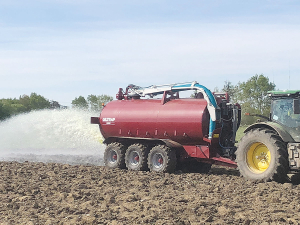DairyNZ opens applications for associate director role
DairyNZ is giving New Zealand farmers a unique opportunity to gain hands-on governance and leadership experience within the dairy sector.
 When making the decision to install or upgrade a farm dairy effluent system it’s important to ask the right questions.
When making the decision to install or upgrade a farm dairy effluent system it’s important to ask the right questions.
Choosing the right effluent system requires professional advice, considering future plans, and picking the right person for the job.
When making the decision to install or upgrade a farm dairy effluent system it’s important to ask the right questions, gather information and take professional advice.
You want the system to work well for many milking seasons to come so it’s important to consider the following:
Planning the right system is important.
One system is the travelling irrigator – the traditional design with a stormwater diversion in place at the yard. The effluent flows from the yard through a stone trap to a storage facility either via gravity feed or pump. It is then irrigated to land using a travelling irrigator. It’s best suited for farms with no landscape/ climate/ soil risk factors, freely drained soils, flat to gently sloping ground, moderate labour input and also for regular shaped paddocks.
Another system is the low-rate sprinkler with mechanical separation.
This system has a storm water diversion at the yard. The effluent then flows through a stone trap to a mechanical separator where the solids are removed. The liquid is then pumped to storage and irrigated to land via a small number of low-rate applicators that are moved frequently.
This is best suited for farms that require flexibility in application depth and rate, such as high-risk soils, high rainfall areas or sensitive catchments, especially suited to poorly drained or artificially drained soils, all slopes and works well in small or irregular paddocks.
The muck spreader system typically includes a storm water diversion then flow through a stone trap to a storage facility. A pump station is required if there is no gravity to storage. Effluent is stirred and sucked from storage into a muck spreader truck and sprayed to land.
This is best suited for smaller farms and lower cow numbers, or when applying effluent to remote areas, all types of soils and flat to sloping land.
Article by DairyNZ
The World Wide Sires National All Day Breeds Best Youth Camp Best All Rounder plaudit has become family affair, with 2026 Paramount Cup winner Holly Williams following in her sister Zara's footsteps.
DairyNZ is giving New Zealand farmers a unique opportunity to gain hands-on governance and leadership experience within the dairy sector.
Herd improvement company LIC has posted a 5.2% lift in half-year revenue, thanks to increasing demand for genetics.
According to the latest Fresh Produce Trend Report from United Fresh, 2026 will be a year where fruit and vegetables are shaped by cost pressures, rapid digital adoption, and a renewed focus on wellbeing at home.
The Roar is a highlight of the game hunting calendar in New Zealand, with thousands of hunters set to head for the hills to hunt male stags during March and April.
OPINION: The past few weeks have been tough on farms across the North Island: floods and storms have caused damage and disruption to families and businesses.
OPINION: Fonterra may be on the verge of selling its consumer business in New Zealand, but the co-operative is not…
OPINION: What does the birth rate in China have to do with stock trading? Just ask a2 Milk Company.